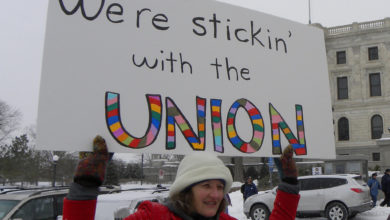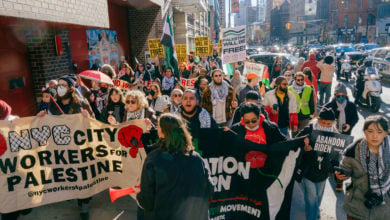On Saturday, Sept. 13, Hurricane Ike struck land as a Category 2 storm with 110-mile-per-hour winds. Following shortly after Hurricane Gustav, the eye of Hurricane Ike passed over Galveston, Texas, and surged 500 miles wide. The storm caused severe flooding and power outages in ten states affecting at least six million people, and four days after Ike hit, the death toll has reached 50 people.
|
As of Sept. 17, very little was back to normal for the millions of people affected by the devastation. In Galveston, water and sewer systems were still not functioning, and its only hospital, the University of Texas Medical Branch, was closed due to lost generators. According to Steve LeBlanc, the city manager, at least 40 percent of the city’s residents were not evacuated before the storm struck.
On all accounts, the relief effort is sorely inadequate, having left millions to fend for themselves for days after the storm. FEMA is directing relief efforts to areas that have been declared “disaster areas.” Twenty-four hours after Ike landed, few relief supplies if any had been distributed. There were minimal plans in place to get food or water to those affected, and even the location of relief supply sites outside of Houston were not accessible to many residents. The relief shortage is coupled with a 6 p.m. to 6 a.m. curfew in Galveston, where the National Guard and local police arrest those who leave their homes to search for relief supplies.
Instead of preparing for the storm and organizing an effective evacuation, federal officials left residents to plan for their own survival in the days following the storm. Even some relief providers were left without food. According to one hurricane preparedness expert, 90 percent of people claimed that they were prepared to survive at least three days on their own without any government assistance.
Walter Gillis Peacock, the director of the Hazard Reduction and Recovery Center at Texas A&M University explained: “There’s still a sense of … not addressing the fundamental issues of coordination, information flow, and issues of constantly outsourcing things. … There will be problems figuring out how much is needed where, and then how to get it there.”
It is in times of crisis, either natural or human-made, that the character of the capitalist government is starkly revealed and the true role of the state as a protector of private property is exposed. The 2007 federal budget is close to $3 trillion. Close to $600 billion, or a sixth of that budget is spent on the military, which does not include supplemental appropriations in the hundreds of billions of dollars for the war in Iraq and Afghanistan. Close to $250 billion, over 10 percent is spent paying interest to the banks. Yet the combined 2007 budget for FEMA and the Disaster Relief Fund was a little more than $5 billion, or less than 1 percent of the federal budget.
Looking at the federal budget allocations, it is clear that there is no lack of government resources that could be made available to protect vulnerable regions from natural disasters, plan for the safe evacuation of populations potentially in harms way of hurricanes and provide the means to rebuilt areas destroyed by hurricanes.
The government mismanagement of the evacuations and rebuilding after Hurricanes Katrina and Rita is evidence of the criminal conduct of capitalism. The federal government’s main mission is not to protect people but to facilitate big business and protect the assets of the billionaire class.
For example, the federal government just loaned American International Group (AIG), a private insurance company, $85 billion dollars to keep the company from collapsing. This is more than five times the amount earmarked for Gustav survivors in Louisiana.
In New Orleans, hundreds of thousands of residents were affected by Hurricanes Ike and Gustav, just three years after they were hit by hurricanes Katrina and Rita. For the many people who are still dealing with FEMA assistance problems from Hurricanes Katrina and Rita, they must return to FEMA to register separately for Hurricane Gustav, and again for Hurricane Ike. Moreover, FEMA resources are spent on inspectors who must separately assess the damage from each separate storm. Currently, FEMA has registered approximately 358,966 Louisiana residents for Gustav relief, and approved $16.5 million in aid, just under $46 per registration.
In Illinois, the governor declared seven counties disaster areas after Ike flooded hundreds of streets and blacked out 2 million homes across the Midwest. The rain flooded Chicago’s 4,300 miles of sewers, which backed up into homes, streets and lots. One Albany Park neighborhood resident explained that “[p]eople were running around like chickens with their heads cut off trying to stop the damage.” A resident of Munster, Indiana who was evacuated from his home by boat explained the lack of planning that led the National Guard to evacuate about 5,000 residents over the weekend due to flooding: “The water was nothing but a trickle in the middle of the street and by the time we decided what to do it was too late.”
The lack of planning, relief mismanagement and disregard for the welfare of people has directly led to the 50 deaths from Ike to date, but the worst may still be to come. According to the Johns Hopkins Office of Critical Event Preparedness and Response, in the United States, most deaths from hurricanes typically occur after the storm passes due largely to lack of access to clean water and lack of available disease treatment. Power failures can stop water purification for weeks at a time. Seawater, sewage and chemical leaks make the water undrinkable. When people drink contaminated water, they can become very sick or die from diarrhea and dehydration. This is coupled with pest infestations, such as mosquitoes, and medical facility closures, both of which contribute to the spread of disease.
The death and destruction that followed Ike were entirely preventable. In Cuba, a country with a gross domestic product of approximately 0.3 percent of the U.S., only five people died as a result of Hurricane Ike, which hit the island as a Category 4 storm. This death toll in Cuba was significantly higher than that of other hurricanes in recent years. Since 1998, only 23 people have died as a result of hurricanes in Cuba. While 26 people in Louisiana died from Category 1 Hurricane Gustav, no Cuban lives were lost even though Gustav hit Cuba as a Category 4 storm. Hurricane Katrina was a Category 3 storm when it hit the U.S. in 2005.
Complacency and lack of planning directly cause death in the U.S. as a result of natural disasters. Likewise, there have been only shallow aid commitments on the part of U.S. politicians in Washington. Days after Hurricane Ike, President Bush visited some disaster areas in Texas, hovering above the devastation in an Air Force 1 helicopter. He explained that the government would cover the cost of debris removal and “hotel rooms and apartments.” He never promised that the government would cover the full value of anyone’s home or of anyone’s belongings. He never assured that people would have a place to stay until their homes are habitable. Meanwhile, in Washington, D.C., politicians in Congress are bickering over whether to pass an economic stimulus package that would include federal money for Hurricane Ike recovery. Finally, neither Barak Obama nor John McCain has even visited hurricane-ravaged Texas, and neither plans to do so, although both have sent their best wishes to homeless residents.
The past three years of hurricane destruction should be a lesson in emergency prevention, but U.S. corporate bureaucrats have a different priority. They are more concerned rescuing insurance companies than flood survivors. Without a system of planning that prioritizes the needs of people over profitable government outsourcing, workers in the U.S. will continue to suffer more from the government’s failings than from the “natural disasters” themselves.







